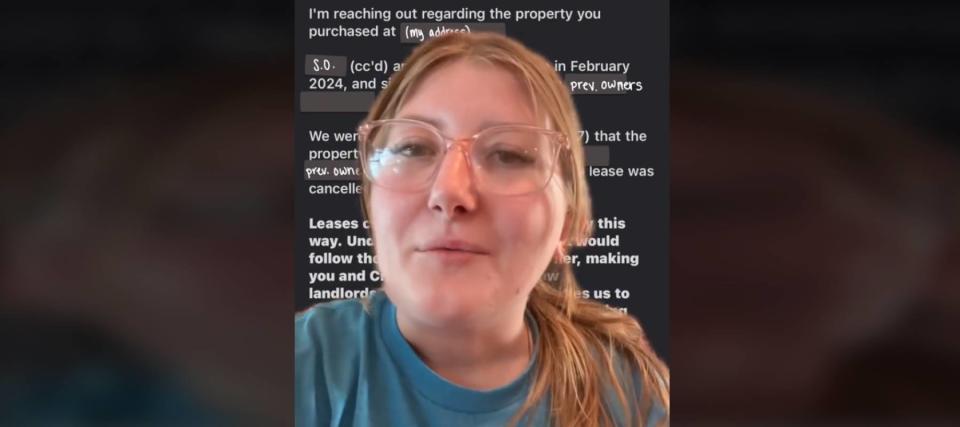Texas couple bought a home — only to find out it had been leased. Do they have to vacate their new abode?

McCayleigh Daniels got herself a sweet deal: she bought a house and didn’t even have to move. The Texas-based voice actor and her fiancé purchased the home they had been renting for the past two years.
A month after her June closing date, Daniels received a strange email. The emailer said they had signed a lease with the previous owners and would be moving in on Aug. 7.
Don't miss
Commercial real estate has beaten the stock market for 25 years — but only the super rich could buy in. Here's how even ordinary investors can become the landlord of Walmart, Whole Foods or Kroger
Car insurance premiums in America are through the roof — and only getting worse. But 5 minutes could have you paying as little as $29/month
These 5 magic money moves will boost you up America's net worth ladder in 2024 — and you can complete each step within minutes. Here's how
Daniels had never been told of any existing leases on her new home. This was even more strange considering that she had been leasing it until that point. She started emailing with this person, asking questions. The emailer loosely threatened to pursue legal action against her.
“My mom has been a realtor for maybe 20 years, and she’s never seen this before,” she says in her viral TikTok, posted on July 30.
Daniels said she was worried she would have to move out of her own home to honor an old lease. But here’s why she’ll avoid being cast out into the street.
How did this happen?
As many of the commenters on the viral video theorized, Daniels likely received an email from a scammer.
“Just bought a house. Our realtor actually warned us about something like this,” one commenter writes. “Because it’s public that you bought the house, people will try to say they have a lease for your home to get money from [you].”
Whenever you buy a home, it is important to record your deed with the local county clerk’s office, according to not-for-profit TexasLawHelp.org. The county clerk’s records are public.
All you need on the deed are the bare bones: the new owner, the previous owner, the property description and any encumbrances — any limitations on how the land can be used. You have better legal standing on your property with one. Without a recorded deed, the previous owner could technically sell it to someone else, resulting in a very messy legal battle.
With your deed in the public domain, it means anyone can see who owns a property in Texas, and it does leave you susceptible to being targeted for fraud.
Read more: Car insurance rates have spiked in the US to a stunning $2,150/year — but you can be smarter than that. Here's how you can save yourself as much as $820 annually in minutes (it's 100% free)
How to avoid being scammed
After August 7, Daniels posted another TikTok video to update her viewers. She said she stopped emailing the possible renter and sent their complaint to her title lawyer, as well as the previous owners. She’s heard nothing about the matter since — and no moving trucks arrived at her place on Aug. 7.
“We’re in the clear,” she confirmed in the video.
Just like Daniels, it’s best to speak with a lawyer before responding to emails regarding claims on your new home.
As one commenter aptly put it: “Stop communicating until you have representation. I know it feels expensive but it’s worth it to save your house.”
If lawyers, deeds and public domains make you anxious, there are other ways to invest in real estate without buying a home. You can purchase real estate investment trusts (REITs), which operate like stocks in the market. You can buy and sell them, like any other share, and avoid the logistical nightmares that can arise when you own one or more properties.
What to read next
Unlock access to 4,700+ hand-picked, single-family homes across America — and the juicy rental cash they can generate. Here's how to start with as little as $10
Jeff Bezos and Oprah Winfrey invest in this asset to keep their wealth safe — you may want to do the same in 2024
Rich young Americans have lost confidence in the stock market — and are betting on these assets instead. Get in now for strong long-term tailwinds
This article provides information only and should not be construed as advice. It is provided without warranty of any kind.